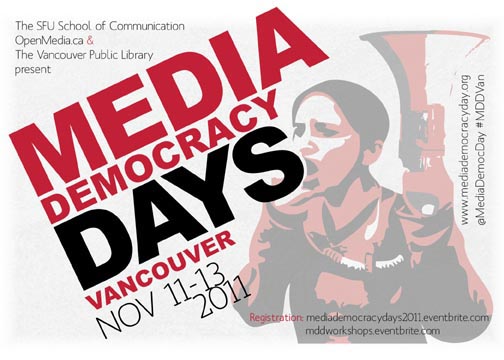In 1996, a coalition of citizens, researchers, academics, and activists in Vancouver emerged in response to the takeover of much of Canadian Press by Hollinger’s Inc. The coalition, later re-named Openmedia.ca, started a one-day event called Media Democracy Day in 2001 where issues including the impact of the concentration of media were discussed.
Now in its 10th year, Media Democracy Days has evolved into a three-day event in three different locations, allowing different communities and panel speakers to tackle topics such as copyright policy, media representations, and documentary film productions.
One of the key panel discussions this year, “Media Policies for a Democratic Future”, includes Libby Davies (NDP), Elizabeth May (Green Party), and Hedy Fry (Liberal) party. They are due to speak at the Alice MacKay Room in the Vancouver Public Library on Saturday, Nov. 12th at 2:30 p.m.
In an interview, Libby Davies and Elizabeth May provided an overview of the theme of this year’s Media Democracy Day, “Know the Media, Be the Media, Change the Media.”
Concentration of the ownership of media was important to both MPs. Davies described how a recent feature in the Vancouver Sun on GLBT issues members only sought out interviews with members of the Conservative and Liberal parties. The NDP, a strong advocate of the GLBT community, was never mentioned in any context at all.
“It is harder and harder [to deal with the media today] because everything comes down to a common denominator,” Davies said.
The concentration of the ownership of the media also means that it gets more difficult to target the specific local media efficiently. Davies described how she gets quoted in news media of different cities instead of Vancouver and how this does not allow her to reach her local audience. For her, talking to her audience through traditional media channels has become more difficult as she does not have control over where the news will be published or how it will be framed.
In the last election, Elizabeth May was deliberately excluded in the leadership debate on CBC. It was an “arbitrary, anti-democratic decision for which there is no appeal. They have no rules, or criteria,” said May, referring to the leadership debate.
May has similar concerns to Davies. They both think ownership of the media influences the frame in which the media talks about certain issues or leaves out certain issues.
“The climate crisis is being consistently ignored by the mainstream media,” says May, describing how the media influences public opinion by simply ignoring a certain issue and focusing on subjects they push as important.
In the end, Davies and May need to communicate their message to their audience through the mainstream media and as a consequence of their experiences there seems to be a shift in the strategies of both MPs — social media platforms have become important, relying less on getting their voices heard by the mainstream media.
They became the media themselves, in a sense, because they realized the importance of the ability to directly communicate with their audience on issues that may not get coverage in the MSM. With “Being the media” as a theme at the Media Democracy Day this year because of the advent of social media, blogs, and the interweb — accessible to anyone and user friendly. The public can find tags of specific interest to them and find out the current news faster than through the mainstream news media. Hence, one is no longer a consumer of media, but also the producer of media content.
Cases in point, the coverage of post-election turmoil in 2009 in Iran and the Arab Spring in 2010-2011 was primarily done by the people who participated in the movements. The cooperation of the network of people from all around the world who tweeted and re-tweeted the news daily allowed for everyone to hear the story of the public from the public. The people were the media and the autocratic governments could not stop information dissemination in any form.
Such is the power of citizen journalism, which challenges the assumption that mainstream media is the only option as a news source because opinions that are not in synch with the mainstream media have been able to make their voice heard through finding and mobilizing their networks in the attempt to introduce different frames of thought to a story.
Both Davies and May agreed that social media is a great tool in communicating with their public, but also want to address the power of mainstream media in influencing the public.
“I do not think they [the social media channels] have yet achieved the level of being politically relevant to offset the negative impacts of the corporate control by a handful of media barons,” May said, pointing out that there has to be some form of anti-trust legislation as a way to hold the media more responsible in creating a democratic media sphere.
Being the media, hence, becomes part of the process of changing the media sphere to a more democratic and inclusive system. This is why Media Democracy Day’s goal is to find ways to change the media through “collaborating with community members to create progressive coalitions and actionable political goals.”
Media Democracy Days takes place in Vancouver this weekend. For more information, please click here.
Siavash Rokni recently graduated from Simon Fraser University’s Communications program, and is winner of the SFU dean’s undergraduate research award with Dr. Katherine Reilly on a project on open media development in international development.



